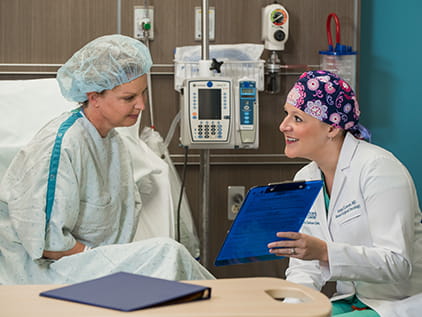October 07, 2019
Breast cancer is the most commonly diagnosed cancer in women in the United States (beyond some skin cancers). One in every 8 women will be diagnosed with breast cancer in their lifetime. Some women, however, are at an even higher risk for breast cancer. These women may be eligible for additional screening and prevention strategies.
The High-Risk Breast Clinic at The University of Kansas Cancer Center is a significant strength well recognized by breast medical oncologists. Our program offers women a thorough assessment of their breast cancer risk, genetic testing when indicated and provides women with a plan for breast screening and breast cancer prevention recommendations. In addition, we offer women breast cancer prevention clinical trials – both national trials and trials only found at The University of Kansas Cancer Center.
What does it mean to be at high risk for breast cancer?
Typically, we think of women to be at high risk for breast cancer if their breast cancer risk is almost double that of the average woman – somewhere around a 20% risk of developing breast cancer in their lifetime. Women may be at increased risk based on:
- A family history of breast cancer
- A genetic mutation that is associated with an increased risk of breast cancer
- Prior breast biopsies showing an atypical lesion or carcinoma in situ
- Undergoing radiation to the chest prior to age 30
- High breast density
What type of screening is recommended?
Women at an increased risk for breast cancer may be recommended more frequent clinical breast exams and additional imaging beyond the annual mammogram including automated breast ultrasound or breast MRI.
How can women reduce their risk of breast cancer?
For some women, chemoprevention may be an option for breast cancer risk reduction. Chemoprevention involves taking a medication daily for 5 years that has been shown to reduce a woman’s risk of breast cancer by almost 50%. For other women with a very high risk for breast cancer, prophylactic surgery can be considered. We also address lifestyle factors important for breast cancer prevention – including maintaining a healthy body weight, exercising and limiting alcohol intake.
Why join a prevention clinical trial?
Many women with an increased risk of breast cancer are not eager to take chemoprevention medications, despite the significant benefit of reduction in risk, because of the potential side effects. In our Breast Cancer Prevention and Survivorship Research Center, we aim to provide women access to clinical trials investigating new ways to reduce a woman’s breast cancer risk while minimizing side effects. In addition, we know that making lifestyle modifications can be difficult, and some of our studies focus on weight loss, diet and exercise for breast cancer prevention.

Your best option for beating cancer
The Women’s Cancer Center at The University of Kansas Cancer Center focuses on breast and gynecologic cancers, providing specialized care to women.
